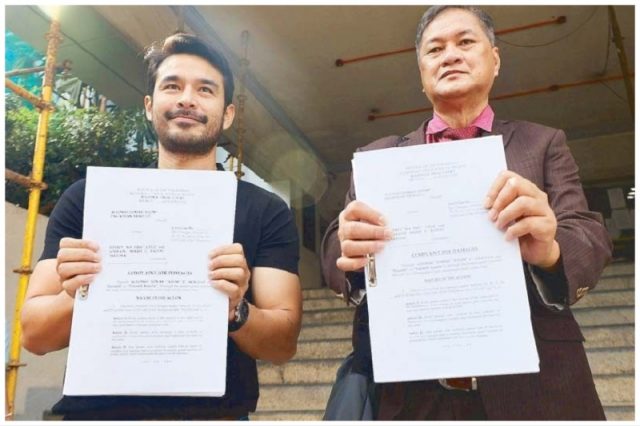
In suing Sonshine Media Network International (SMNI) hosts former anti-communist task force spokesperson Lorraine Badoy and alleged rebel-turned-whistleblower Jeffrey “Ka Eric” Celiz, broadcast journalist Atom Araullo opted to file a civil case instead of a criminal case.
“It merits emphasis that I am not filing a criminal case against Badoy and Celiz at this time. I am against the criminalization of libel and would prefer not to invoke it because it also endangers legitimate journalism,” he said in a statement on Monday, September 11.
READ: Atom Araullo files P2-million damage suit vs red-taggers Badoy, Celiz
The broadcast journalist leveled the charges after the two television hosts red-tagged him and his mother, activist Carol Araullo.
Atom said that the attacks “seem to be part of a broader pattern to harass and undermine members of the media whose reporting does not fit their agenda.”
Libel and cyber libel are dark clouds hanging over journalists, weaponized by some government officials and individuals to arrest and prosecute them in an attempt to “intimidate and punish the individuals charged” and “create a climate of fear, chilling critical reporting by other journalists,” according to a United Nations special rapporteur.
In the Philippines, libel is a criminal offense under Article 353 of the Revised Penal Code that punishes the “public and malicious imputation of a crime, or a vice or defect […] tending to cause the dishonor, discredit, or contempt of a natural or juridical person, or to blacken the memory of one who is dead.”
With technological advancements, the Cybercrime Prevention Act of 2012 established cyber libel as a criminal offense wherein libel is committed “through a computer system or any other similar means which may be devised in the future.”
A report commissioned by the National Union of Journalists Philippines showed that local politicians took the lead in filing libel charges against journalists.
More than 60% of monitored cases were filed by mayors, governors, representatives, barangay chairpersons and provincial board members.
Perhaps the most high-profile journalist to be slapped with imprisonment over a cyber libel charge is Maria Ressa, chief executive officer of Rappler, who, alongside reporter Reynaldo Santos, could face six years in jail because of what prosecutors alleged as inaccurate linkage between a businessman and drugs that was left uncorrected for years.
Other journalists who were handed down the guilty verdict include Frank Cimatu, a Baguio-based journalist convicted of cyber libel for claiming on Facebook in 2017 that a former agriculture chief got rich by about P20 million because of the bird flu.
The push to decriminalize libel continues. Sen. Risa Hontiveros filed Senate Bill 1593 in December 2022 to repeal laws against libel and cyber libel to “defend press freedom.”
“These journalists have wasted years of their lives facing charges for basically doing their jobs. Gamit na gamit na ang cyber libel para patahimikin ang ating mga mamamahayag. Kung hindi natin maiwasto ito, patuloy na gagamitin ang libel para kitilin ang ating kalayaan,” she said in a statement.
The bill, however, remains pending at the committee level.
Associate Justice Marvic Leonen, the sole voice in advocating decriminalization when the Cybercrime Prevention Act was brought up to the Supreme Court, called cyber libel an “infringement upon the guarantee of freedom of expression.”
RELATED: Can you be sued for cyber libel if your post is true? Chel Diokno explains
“Given the statutory text, the history of the concept of criminal libel, and our court’s experience with libel, I am of the view that its continued criminalization, especially in platforms using the internet, unqualifiedly produces a chilling effect that stifles our fundamental guarantees of free speech,” he wrote in 2014.
Although libel is not going to decriminalized soon, there’s a glimmer of hope: About one-third of cyber libel charges leveled against journalists from 2012 to May 2022 have been junked, according to the data from the Department of Justice Office of Cybercrime, reported by a news outlet.
Meanwhile, for Gilbert Andres of the Center for International Law, these numbers point toward decriminalization.
“Decriminalizing libel and cyber libel will free our public prosecutors to allocate their precious time and energy to prosecuting criminal cases that affect the national interest and our territorial integrity,” he was quoted in an interview.









